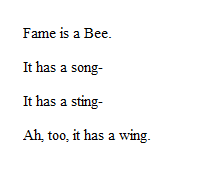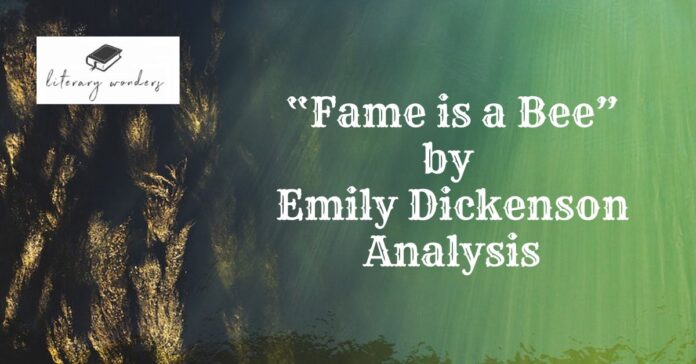Introduction
“Fame is a Bee” is a short and meaningful poem written by Emily Dickenson, a phenomenal American poet, and writer. This short poem compares fame to a bee, implying fame does not last long. Instead, it keeps on moving like a bee. Fame is used as an extended metaphor, comparing a bee’s characteristics to fame’s.
Emily’s purpose in writing this remarkable poem is to show how fame might sound magnificent, but it has disadvantages. It may lead people to glory for some time, but that glory eventually fades away with time. Although Emily Dickenson was not famously recognised during his lifetime, yet she had a deep, realistic, and true understanding of fame. This poem was most likely just an observation of the people she met.
In depth Analysis of the Poem

In the poem’s opening lines, the speaker says that fame can be like a bee, buzzing around you and causing you trouble sometimes, but in the end can make you feel happy and content with life. It not only makes you feel special but also wins a lot of well-wishers for you.
The line “Fame is Like a Bee” focuses on fame rather than how fame can affect one person. Fame in today’s society means having an enormous social media following, constantly being talked about by tabloids and gossip magazines, and having lots of money because you’re famous.
As the poem continues, the speaker brings to light the negative characteristics of fame, saying fame has a sting, implying it does not last long. In the poem’s last two lines, the speaker reflects on the bitter reality of the glamorous world. Also, she sheds light on people’s changing attitudes. A famous person wins accolades for a specific time. Unfortunately, when his popularity declines, he no longer receives love and warmth from his well-wishers.
Major Themes in the Poem
Although the poem has only four lines, yet it carries various conventional themes like transient nature of fame, bitter realities of the world and change.
1. Don’t Love Fame
Through this simple poem, Emily suggests that we should not love fame if we wish to avoid chaos. To her, love of fame usually causes people to get discouraged when they don’t get the fame they hoped for.
The best way to avoid this feeling of discouragement is not to love fame in the first place. If you’re not expecting much from your life and you expect little from yourself, then anything will seem good, even just being one of the many anonymous bees in the hive instead of being one of the few famous ones on top.
2. Avoid Mistakes
Avoiding mistakes is another important theme of the poem. The writer says suggests that don’t get too focused on fame. Instead, do what you love and do it well without thinking about what others think of your work. You’ll find that the more you love something, the more likely it will be successful.
Don’t lose your identity in the process: Just because you’ve achieved some level of success doesn’t mean that you have to lose who you are in order to keep up with the latest trends or remain relevant.
3. Be Original
This is another important theme of the poem “Fame is a Bee.” The speaker suggests that one should not blindly follow the patterns of the world. Finding your niche in the world feels great, but if you want people to take notice of you, you need to be different. You have to stand out from the crowd with your work and get noticed for what you do best.
If you’re not being seen by anyone because your work isn’t different enough or because they don’t know who you are, then there’s some work that needs to be done on establishing yourself as an expert in your field.
4. Change
Change is a minor theme of the poem. However, change is inevitable; you’ll never be able to stop it from happening, even if you want to. The best thing you can do for yourself and your business as an entrepreneur is to get used to the idea that change will happen.
Thus, prepare yourself for whatever may come your way so that when change does happen, you’re ready to take advantage of the opportunity.
Suggested Readings
“We Grow Accustomed to the Dark” by Emily Dickinson
Review of the Book Manuscript Found in Accra by Paulo Coelho











